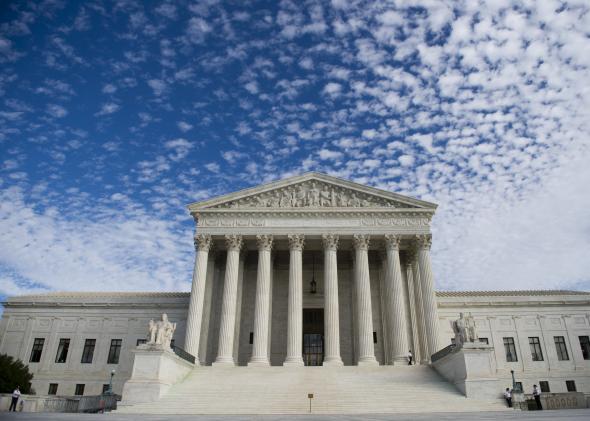A divided Supreme Court handed a big defeat to the Obama administration and numerous civil rights groups early Saturday morning when it ruled that Texas can enforce its 2011 voter ID law in November that some have called the strictest in the country. Three justices dissented from the ruling that rejected an emergency request that had been filed by the Justice Department and civil rights groups.
The decision appears to mark “the first time since 1982 that the Court has allowed a law restricting voters’ rights to be enforced after a federal court had ruled it to be unconstitutional,” notes Scotus Blog’s Lyle Denniston. A federal judge had struck down the law last week, saying that some 600,000 voters—mostly black or Latino—would face difficulties at the polls due to a lack of proper identification. The law, which was approved in 2011 but only came in effect in 2013 lays out seven approved forms of identification—a list many have questioned for including concealed handgun licenses but not college IDs, notes the Associated Press.
This marked the fourth time over the last few weeks that the Supreme Court has been forced to decide whether voter ID laws passed by Republican state legislatures can be used in November. The justices voted to allow changes in Ohio and North Carolina and stopped a new law in Wisconsin. “The common denominator in each seemed to be that it was too late in the election year to require the states to change the way they had planned to handle the elections,” notes the Washington Post. That was precisely the reasoning why a U.S. Court of appeals said the law could be used even though a district judge said it seemed to target minority voters.
The fact that the Texas ID law had been subject to a full trial on the ID requirements and a judge developed “an extensive record” on how the measure would block access to the polling stations made this case different from the others, according to Justice Ruth Bader Ginsburg, who dissented along with Justices Sonia Sotmayor and Elena Kagan. “The greatest threat to public confidence in elections in this case is the prospect of enforcing a purposefully discriminatory law, one that likely imposes an unconstitutional poll tax and risks denying the right to vote to hundreds of thousands of eligible voters,” Ginsburg wrote.
The president of the NAACP Legal Defense Fund called the ruling “an affront to our democracy” as it “means hundreds of thousands of eligible voters in Texas will be unable to participate in November’s election because Texas has erected an obstacle course designed to discourage voting.”
